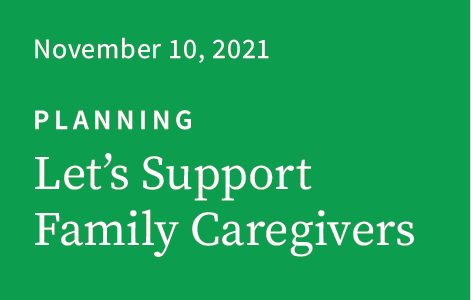Transcript
Let’s Support Family Caregivers
If you’re one of the 53 million caregivers in the United States, you may know instinctively, from hands-on experience, just how important your care can be to the quality of your loved one’s life—from feeding and hygiene to helping with medications and transportation.
But what you might not know is that the difference you make is measurable: Research shows that people who have caregivers are demonstrably healthier. And that has a ripple effect, resulting in fewer doctor’s visits, hospitalizations, and institutionalizations—which all translates to lower health care costs.
For example, a recent analysis showed that Medicaid patients with some family involved in home care spent $1600 less on health care over nine months than those without a caregiver. The authors considered a possible link between the lower cost and better health: These individuals had lower rates of infection, bedsores, and shortness of breath, among other measures, and as a result, used health care resources less often.
A different six-month study looked at whether the emotional health of the spousal caregiver—the husband or wife—had an effect on health care costs; specifically, they looked at the caregivers’ sadness on the depression scale. What they found is that the higher costs were significantly associated with caregiver sadness; sad caregivers spent over $1300 more on health care.
The importance of caregivers is even more evident for people with dementia, whose cognitive decline may make communications even harder. Of course it makes perfect sense that having a caregiver nearby would help by making sure that critical needs are met.
And yet, as essential as family caregivers are, health care plans and systems often neglect their needs—support is spotty at best. For example, only 1.5 percent of Medicare Advantage Plans offer coverage for caregiver-focused support and programs. Part of the problem lies in the misconception that caregiver support is just too expensive or irrelevant for health care systems. But as we’ve just seen, supporting caregivers may not only be good for the health of their patients, but also a good investment for health care systems. If family caregiving is healthier for patients and more economical, why isn’t it better supported? Imagine what could happen if caregivers got support.
Fortunately, things are changing.
There are many ways that health plans and systems can support caregivers—and some do. They can make caregiver support groups part of their plans, giving enrollees the chance to share and learn important skills. They can acknowledge the central role of caregivers by making support part of the patient’s health plan. They can use technology to make care easier. For example, they may leverage automated, customized phone check-ins and share timely care tips. These are just a few strategies identified by me and my colleagues through our research as being not only effective, but cost-effective.
A good model is the Resources for Enhancing Alzheimer’s Caregivers Health (REACH VA) from the Veteran’s Administration. REACH VA combines caregiver education, support, and skills building. The program was not only shown to improve health-related outcomes for patients, such as less depression and better medication management, but by reducing outpatient visits, hospitalization, and medication uses, it reduced costs for the VA by more than a third. Programs similar to REACH VA can be found through local nonprofits, Area Agencies on Aging, and the Alzheimer’s Association. What a win-win-win for patients, caregivers, and the health care system!
Health care policy is also starting to broaden its focus to include the support of caregivers. For example, about 40 states have signed the Caregiver Advise, Record, Enable (CARE) Act into law. The CARE Act sets standards of care for the support of family caregivers whose loved ones are hospitalized. It requires hospitals to identify caregivers, ensure that caregiver information is part of the patient’s medical record, and put programs into place to make caregivers part of the plan for patients after discharge. Even though this is a hospital-specific program, it is really good news!
Also, about two years ago, the Centers for Medicare & Medicaid Services authorized Medicare Advantage Plans to cover direct support for family caregivers using supplemental benefits. What this means is that Medicare Advantage health plans now have more flexibility to design benefits that support their enrollees’ caregivers. This is a huge improvement as it gives health plans more autonomy to directly develop or purchase services that support caregivers.
However, Medicare Advantage Plans have been slow to integrate the policies. We still have more work to do to make these recent advances a reality. Our efforts need to extend beyond private and public health plans, and even beyond state policy, to make high-quality support available to caregivers on a large-scale basis. We need to build caregiver support into our health care infrastructure, its very groundwork—and that demands national attention.
The Recognize, Assist, Include, Support, and Engage (RAISE) Family Caregivers Act, which became law in 2018, is a very promising step. It directs the Secretary of Health and Human Services to identify actionable steps for local communities, care providers, government, and other public agencies.
The aims of the RAISE Family Caregivers Act are wide-ranging. It is looking to support the health and independence of patients and caregivers across all health care and long-term settings through programs to improve access to housing, safe living spaces, food, and transportation, and also to reduce social isolation. It’s examining ways that health care providers can create more meaningful and culturally relevant information, services, and support for family caregivers. The RAISE Family Caregivers Act is exploring respite care, as well as workplace policies that would include flex time or home office options for caregiver employees.
There’s much left to do, but there is also help available to caregivers now.
Contact your health plan and ask them about care options for you and your loved one, such as support groups and respite care. If they do not have these offerings, simply asking may register as a gentle nudge that there is a need they should be considering!
Your local Area Agency on Aging (AAA) is also a good source, and may also provide respite care along with other valuable support services. Free insurance counseling is sometimes available, or they may direct you to other agencies.
If you want to take a more active role in effecting change, your AAA may be a great place to start. AAAs along with other national advocacy agencies such as the Alzheimer’s Association often invite public participation on local or national levels. Follow their social media and voice your opinions!
There’s no quick fix for this complex societal issue. But I’m optimistic that there will be more organizational and policy improvements to better support caregivers.
Venus Wong, PhD BCBA
Founder
Project Formula
Affiliated Scholar and Consultant
Stanford University

